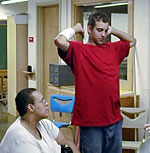By Tim Pugmire
Minnesota Public Radio
September 4, 2002
Most high school students in Minneapolis and St. Paul are starting the school year this week under a new structure that stresses small-group experiences and personalized instruction. Supporters of the approach -- known as Small Learning Communities -- say students will see the relevance of their education by exploring various careers. Critics claim the schools are abandoning the liberal arts to become job training centers.
| |
|
|
|
||
Incoming 9th graders at Patrick Henry High School in Minneapolis got their first taste of Small Learning Communities during new student orientation. Teacher Charles Johnson-Nixon described the new commercial and fine arts program for students and their parents.
"This program is geared toward people who have an interest in art but is a rigorous academic program that's going to challenge you and make you focus on all of the academic disciplines that we offer in this school," he said.
There are about 120 students in each of the four small learning communities available to 9th graders at Henry. The options include art, engineering, international baccalaureate and an open magnet.
Student Morgan Toley says he's excited about the art program because he likes to draw. His mother, Nancy Toley, says she thinks the small learning communities will help a lot of students.
"Because it's geared to help them be prepared to find a job whether they go to college or not after they finish the four-year program. And I think that's something been lacking in the past," she says.
School district officials say students enrolled in small schools or specialized programs are more likely to stay in school and graduate. Currently, only about 45-percent of Minneapolis 9th graders are graduating in four years.
| |
|
|
|
||
Bob McCauley, the district's high school superintendent, says Minneapolis students will now get more attention from a team of teachers.
"We can have projects and community service projects and connected learning which is beyond the four walls of the school. That way we will look at these kids and help them each to figure what some of their individual learning goals might be," according to McCauley.
All seven high schools in Minneapolis have made the conversion this year. In St. Paul, a similar transformation is underway, but the pace is slower. Each of St. Paul's seven high schools is developing its own plan. Harding, Highland Park and Johnson are the first off the ground this year.
Harding High School's 2,000 students are now enrolled in one of six academies, including such themes as fine arts and global business and technology. Principal Deb Henton says some students thrive in a big school, but too many fall through the cracks.
"The typical student may not feel a personal connection to an adult in the building. And what a loss that is, because the adult could be mentoring the student, could help the student develop a four year plan, maybe a six-year plan for what they're going to do post-high school. And so we feel it's a huge loss, and a risk we don't want to take anymore," says Henton.
Henton says while students now spend most of their school day within their academy, they can still sample the full range of classes and activities available in the large high schools.
But critics claim the Small Learning Communities limit choices for students while forcing them down a narrow career path at an inappropriately early age.
Julie Quist, vice president of the Maple River Education Coalition, says the loss of a broad academic experience will leave students unprepared as citizens.
"They're not equipped in the knowledge that it takes to be free and effective citizens when they are not given the broad liberal arts education that is the foundation of freedom in this country," Quist says.
Supporters of the concept disagree. David Evertz of the University of Minnesota's Center for School Change says the career-tracking claim is just not true.
"What we're really teaching are transferable skills. It's not like you make a choice at the age of 14 that then becomes what your life is. Rather you make a choice at the age of 14 about things you're interested in and then you have a chance to keep learning," according to Evertz.
The Center for School Change is assisting the St. Paul school district reorganize its high schools with the help of more than three million dollars in grant money from the Bill and Melinda Gates Foundation. Grants from the McKnight Foundation are helping the Minneapolis school district initiative.
More from MPR

